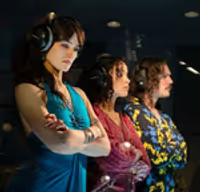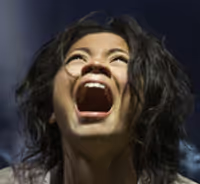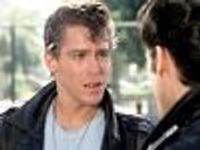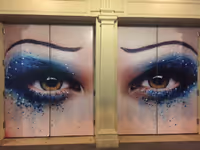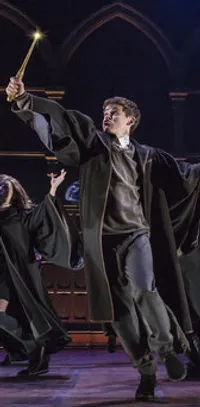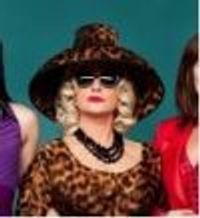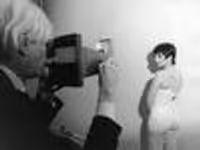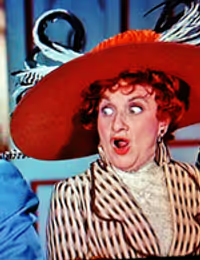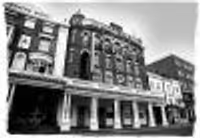The Inheritance - Previews
JeffDaEgg2
Stand-by Joined: 7/29/08
#175The Inheritance - Previews
Posted: 10/15/19 at 11:34am
For seating, I'd recommend side orchestra over front mezz. Since there's really no set, the view won't be obstructive (with the exception of some rush seats on the far side, where you may miss a person or two). Not sure if front mezz is the same, but the rear mezz section has very narrow seats and also not great leg room...not exactly ideal for a long play. I saw part two in the orchestra and I appreciated being closer to the actors. Plus, if you're a guy, being in the orchestra lets you run to the restroom at intermission, which is sadly necessary for this theatre and play!
MemorableUserName
Broadway Legend Joined: 3/27/19
#176The Inheritance - Previews
Posted: 10/16/19 at 12:24pm
I don't know if anyone cares about rush reports, but I got to the box office yesterday between 2:30-3 and got an orchestra right ticket (row J or K) all the way on the far aisle. Great seat, perfect view (I think there was one brief moment near the end when one character was out of view upstage left; otherwise I saw everything). Plus, it was the perfect seat to bolt for the restroom as soon as the show ended (which was necessary).
As for the show, it was entertaining for what it was, well-staged with some excellent performances, and I'm glad I saw it, especially for the price. It was also shallow and overlong, and nothing that's going to stick with me. The main character, who I suspect I was supposed to find noble and such a good person, was just a drip, and some of his motivations were impenetrable beyond "this is what his equivalent in Howard's End did."
SPOILERS
Namely, I never understood what he saw in the Henry character, why he would agree to an engagement with someone he hadn't had sex with, or why he would go through with the marriage after being told they would never have sex. The relationship wasn't at all motivated by the characters and what was on stage, only by "Margaret married Henry in Howard's End, so that's what needs to happen here." All the places the plot split-off from Howard's End rather than being locked in an homage were for the better--I kept expecting how Toby would meet his fate, and was pleased to be surprised, and the resolution of Eric/Henry's relationship was an improvement.
I'm a fairly easy crier and it doesn't take much to get me going. While there were certainly some emotional moments and I felt for the characters (well, primarily Leo, and Toby in his childhood monologue), my eyes remained dry. I've cried through Angels. I sobbed through the staged reading of The Normal Heart they did with Glenn Close and Patrick Wilson before taking it to Broadway. I'm pretty sure I cried during The Waverly Gallery earlier this year. Hell, I got choked up during the finale of freaking Mean Girls. But for all the talk of the generation of young men who were lost, it just seemed superficial, lacking the depth to really hit the way it should. Lois Smith was very good, and as a gay man with my share of mother issues, that monologue should have hit me square in the chest. But I just sat there thinking, "Yeah, that's sad," waiting for the emotion to hit me. It never did, and I think that's solely on the writing. (Just sitting here thinking about the idea of all those boys and men dying with no one and nowhere to go, and a mother reuniting with her son on his deathbed--I'm starting to mist up. That's heartbreakingly tragic. Yet, sitting there in the theater last night, I felt only the barest twinge. When the idea is more devastating in the abstract than how the playwright is able to convey it, that's a weakness of the writing.)
A decent play. It kept my attention and I only felt the length a few times (but especially near the end, when I was ready for it to do just that). Excellent staging. Some great moments. There wasn't a weak performance, and several were wonderful. But I walked away thinking it was overhyped and not really understanding what the big deal was. It's a reasonable night's entertainment, not much more.
BWAY Baby2
Broadway Star Joined: 11/10/14
#177The Inheritance - Previews
Posted: 10/17/19 at 2:43am
So if you find Slave Play to be racist it is because you are uncomfortable looking at your own prejudices?
#178The Inheritance - Previews
Posted: 10/17/19 at 8:52am
I saw Part 1 last night (I was able to get a refund for my original Part 2 ticket after Monday's Part 1 performance was canceled - I'm seeing Part 2 tonight) and I thought it was fantastic. It's not as good as Angels in America and it's certainly not as good as Howards End, but I did find it really well-written and excellently acted.
My biggest quibble is that we lose three wonderful female characters (Margaret and Helen Schlegel and Ruth Wilcox) in the transition from Howards End to The Inheritance, but their stand-ins are very good to excellent. I find Helen to be a tough character personally to connect with, and Toby is probably my least favorite of the three stand-ins. I think both Eric and Walter are wonderful representatives for Margaret and Ruth Wilcox (a character I found much easier to connect with as an adult, upon watching the miniseries and rereading the book). I also thought it was an especially great idea to have Morgan double as Walter - Ruth is the spiritual center of the book, and Morgan/Walter work together as the spiritual center of the play.
I did think the show was a bit precious, a bit winky. I think Lopez is at his strongest in writing monologues, like Walter's and like Eric's at the end of Part 1. I thought the ending tableau of Part 1 was stunning; I was in tears and could hear lots of people around me crying. I'm so excited to see where it goes. (I do also have a lot of thoughts about this vs. Howards End, but I don't have the whole story yet.)
#179The Inheritance - Previews
Posted: 10/21/19 at 11:32pmSomeone please tell me part two makes sitting through the last 3.5 hours of part one worth it because... the emperor truly has no clothes. Aside from one very beautifully written monologue for Paul Hilton and the admittedly touching final moments, I thought it was condescending dreck. Some cringingly overblown acting and far too many lectures that barely even scrape the surface of the issues they’re regarding.
#180The Inheritance - Previews
Posted: 10/22/19 at 7:02am
ColorTheHours048 said: "Someone please tell me part two makes sitting through the last 3.5 hours of part one worth it because... the emperor truly has no clothes. Aside from one very beautifully written monologue for Paul Hilton and the admittedly touching final moments, I thought it was condescending dreck. Some cringingly overblown acting and far too many lectures that barely even scrape the surface of the issues they’re regarding."
I haven’t seen the play yet but I did read the text. I thought the first 60ish pages were not great but it improved from there. I was however blown away by part 2 and I cried many times.
Dolly80
Broadway Star Joined: 5/15/11
#181The Inheritance - Previews
Posted: 10/22/19 at 7:25am
clever2 said: "My friends in London, whether they loved or hated it in its entirety, all tell me part two is the “play part of the play.” I’m guessing that isn’t translating here?"
Play 2 has pretty much been entirely rewritten since London . Why I don’t know, but now I’m worried he has really messed it up.
Dolly80
Broadway Star Joined: 5/15/11
#182The Inheritance - Previews
Posted: 10/22/19 at 7:30am
nasty_khakis said: "Even though I personally prefer Part 2 and it does bare urging people to see it, I still think most casual theater goers (who aren't the type to be on theatre message boards) will be perfectly fine just seeing Part 1. I guarantee in a year or two we'll be asking people about this play and they'll rave and say they loved it but then they'll say they only saw Part 1. It's why they're doing more Part 1 in the schedule."
That’s so stupid. In years to come people will be talking about the play they saw half of? Please. SEE THE WHOLE PLAY. And everyone needs to get over the endless Howard’s End connection- it’s not trying to be a new version of it.
#183The Inheritance - Previews
Posted: 10/22/19 at 1:58pm
I saw the show two weeks ago, and am already starting to have problem remembering a large chunk of it. Plot-wise there was not much going on, and unlike Angels it's not trying to make a grand statement or step out of the upper-middle class white male gay bubble. For this reason most of the lectures are quite hard to get through because they are been said and said more eloquently much better elsewhere. Personally, it's an enjoyable melodrama to sit through, but for the play of the generation it aims to be, a lot of dramaturgical surgeries are desperately needed.
#184The Inheritance - Previews
Posted: 10/22/19 at 10:08pmApologies if this has been covered already, but any reports on merch?
Roscoe
Broadway Legend Joined: 5/15/03
#185The Inheritance - Previews
Posted: 10/23/19 at 8:41am
Dolly80 said: Please. SEE THE WHOLE PLAY. And everyone needs to get over the endless Howard’s End connection- it’s not trying to be a new version of it."
Hmmm. I seem to remember one of the cast, within the first few minutes of Part One, holding up a copy of the novel HOWARDS END and saying that he wanted to do his own version of it. Anybody else remember that? Just me?
#186The Inheritance - Previews
Posted: 10/23/19 at 9:07am
Roscoe said: "Dolly80 said:Please. SEE THE WHOLE PLAY. And everyone needs to get over the endless Howard’s End connection- it’s not trying to be a new version of it."
Hmmm. I seem to remember one of the cast, within the first few minutes of Part One, holding up a copy of the novel HOWARDS END and saying that he wanted to do his own version of it. Anybody else remember that? Just me?"
HOWARDS END was definitely mentioned in the beginning of the play when Morgan asks the students to start writing. Matthew Lopez himself even states how Howards End inspired him to write The Inheritance. I'm not saying this play is a new version of it but there are striking similarities.
In these boards, however, I've read more people comparing The Inheritance to Angels in America rather than Howards End. It's an opinion and should be welcomed on these boards. One of my female straight friends actually asked me about this play the other day and I told her it was inspired by Howards End and guess what? She loved reading the novel back in college and really enjoyed the film back when it came out in the 90s.... and she plans on buying a ticket to The Inheritance! Note I didn't tell her it was a new version of Howards End but simply how it was inspired by it. I doubt she'd even see this play based on the current marketing out there but from learning it was inspired by Howards End, she's now more excited. To each his own.
Roscoe
Broadway Legend Joined: 5/15/03
#187The Inheritance - Previews
Posted: 10/23/19 at 9:42am
Wick, of course, points all taken, but I don't see how it can be claimed that THE INHERITANCE isn't trying to be a new version of HOWARDS END when the play basically begins by announcing that it is, in fact, a new version of HOWARDS END, obviously updated and all that. Events, characters, at least one character name and at least one line of dialogue are taken directly from it.
#188The Inheritance - Previews
Posted: 10/23/19 at 10:08am
Wick3 said: "Roscoe said: "Dolly80 said:Please. SEE THE WHOLE PLAY. And everyone needs to get over the endless Howard’s End connection- it’s not trying to be a new version of it."
Hmmm. I seem to remember one of the cast, within the first few minutes of Part One, holding up a copy of the novel HOWARDS END and saying that he wanted to do his own version of it. Anybody else remember that? Just me?"
HOWARDS END was definitely mentioned in the beginning of the play when Morgan asks the students to start writing. Matthew Lopez himself even states how Howards End inspired him to write The Inheritance. I'm not saying this play is a new version of it but there are striking similarities.
In these boards, however, I've readmore people comparing The Inheritance to Angels in America rather than Howards End. It's an opinion and should be welcomed on these boards. One of my female straight friends actually asked me about this play the other day and I told her it was inspired by Howards End and guess what? She loved reading the novel back in college and really enjoyed the film back when it came out in the 90s.... and she plans on buying a ticket to The Inheritance! Note I didn't tell her it was a new version of Howards End but simply how it was inspired by it. I doubt she'd even see this play based on the current marketing out there but from learning it was inspired by Howards End, she's now more excited. To each his own."
I was already sort of interested in seeing the show, based on the reception it got in London, but my interest was seriously piqued when I found out it was based on Howards End. In fact, the play has made me notice and interrogate characters and happenings in Howards End even more.
#189The Inheritance - Previews
Posted: 10/23/19 at 10:39am
This gets a hard pass from me. Part 2 was somehow even more insufferable than part 1, built on the assumption you actually care for these characters. Spoiler alert: I didn’t. Neither did my husband or our friend. Or, for that matter, the gentleman sitting next to us for both nights.
Everyone is certainly welcome to their opinion, but I found very little to be redeemable about this overblown melodrama. Lois Smith was a breath of fresh air, but the character is utterly unnecessary that late in the game.
If this sweeps the Tonys, I will be massively depressed. The Sound Inside is one of the best plays I’ve seen in years and it’s hard to wrap my head around that gorgeous piece of writing losing to this pretentious soap opera.
#190The Inheritance - Previews
Posted: 10/26/19 at 1:15am
Caught Part 1 tonight and overall, I really enjoyed it. The standout for me by far is the direction and I think the craft of the staging and design elevates the play to an entirely new level that it simply would not live in if it was mounted in any other way.
Andrew Burnap was the highlight for me in the show's shiniest role, and his performance really captivated me. I was surprised to learn it was Kyle Soller who was nominated/won the Olivier - does he have an award-worthy moment in Part 2?
As for the text, it is far from the best play I've ever seen, but it is still undoubtedly phenomenal, and better than the majority of new plays we see. I have to give credit where credit is due, and the 3.5 hours flew by. But ultimately, what made me cry at the end wasn't the story, but instead the tableau. Whether that is Lopez or Daldry's doing I'm unsure, but it was very moving. I'm in no rush to see Part 2, but I'd happily spend 3.5 more hours in that space, regardless of the story being told.
That being said, it's definitely tough to watch a stage full of Calvin Klein models preach the gay experience - it is very one-sided, and the lack of body diversity and explorations of the harsher realities of exile within the gay community holds the play back from being a universal piece. It makes me thankful work like A Strange Loop exists, although people say that'll never come to Broadway - am I the only one who sees an issue there?
#191The Inheritance - Previews
Posted: 10/26/19 at 8:35am
I have a quick question for anyone who has seen Part 1:
Who are the actors featured in the final scene of Part 1? I saw people leaving other exits with cast inserts, but no one was handing them out at the side door I was directed to exit through.
LxGstv
Broadway Star Joined: 11/22/16
#192The Inheritance - Previews
Posted: 10/26/19 at 11:13am
VotePeron said: "That being said, it's definitely tough to watch a stage full of Calvin Klein models preach the gay experience - it is very one-sided, and the lack of body diversity and explorations of the harsher realities of exilewithinthe gay community holds the play back from being a universal piece. It makes me thankful work like A Strange Loop exists, although people say that'll never come to Broadway - am I the only one who sees an issue there?"
Definitely not the only one, I had the exact same thoughts after seeing it. Including being thankful for A Strange Loop!
This is more about part 2:
It also bothered me that most of the side characters don’t even get a resolution, their website states “It begins with a gathering of young, gay New Yorkers.
Each has a story aching to come out…” which gave me the impression it would be more like Boys in the Band. Which isn’t really the case.
Updated On: 10/26/19 at 11:13 AM
#193The Inheritance - Previews
Posted: 10/26/19 at 12:59pm
VotePeron said: "That being said, it's definitely tough to watch a stage full of Calvin Klein models preach the gay experience - it is very one-sided, and the lack of body diversity and explorations of the harsher realities of exilewithinthe gay community holds the play back from being a universal piece. It makes me thankful work likeA Strange Loopexists, although people say that'll never come to Broadway - am I the only one who sees an issue there?"
Agree completely.
#194The Inheritance - Previews
Posted: 10/28/19 at 1:02pm
After having seen both parts 10 days apart, I can say that this averages out to be an effective enough melodrama. A great play? No. Good enough, I suppose. But it never really answers the question of why it deserves so much of our time, or why it presents itself with such an air of importance.
Its engagement with political issues is shallow, with those issues treated like boxes to be checked when they get named; its engagement with the legacy of AIDS is even shallower, with monologues and moments expertly written to pull emotional levers and coax tears from every duct. But for what?
For a play that purports to be about gay community, there's little of it onstage and in the events depicted. The supporting characters are thin and veer uncomfortably into stereotypes, particularly in the group scenes in Part 1 (which made both me and my friend exchange cringey glances). The specter of race hangs uneasily over everything with no engagement. Kushner acknowledges the optics of having his only black character in Angels be a nurse, but at least Belize is given depth! Here we have a sassy black friend who gives crowd-pleasing talking points and exists only as a friend to Eric. ...Great.
It's hard to escape comparisons to Angels because everything about the play seems to invite it. But whereas Kushner used politics and AIDS as a metaphor for so much, Lopez is shockingly literal with it and plays it for sentiment. Where Kushner gave us a complex roster of characters, Lopez focuses on a few and lets the others slide into stereotype.
Class is also an issue the play has an uneasy time with. Lopez takes great care to have Eric repeat in part 1 that he is middle class, but he's still an Ivy League-educated man with a rent-controlled apartment overlooking Central Park- and that's his starting place. Henry Wilcox is literally a billionaire. Toby finds himself with apparently infinite funds after his play debuts on Broadway. Leo, a truly destitute and desperate character, appears only to suffer and then... be saved by and then give Eric's life meaning. But we've ultimately just watched 7 hours of outrageously privileged white men dealing with, well, ultimately very privileged problems.
Yes, that's inherent in something based off of Howard's End. But it didn't have to be. And it's 2019 and if you are going to create a two-part drama and frame it as the next great epic about the gay experience and ornament it with political discourse, then that work opens itself up to a lot of criticism and scrutiny.
As a melodrama, it's effective. As the great gay work it wants to be, it falls short.
The performances are good and it is incredibly well-paced.
#195The Inheritance - Previews
Posted: 10/28/19 at 3:50pm
I saw Part One on Friday, and was concerned that after a long day of work, I would be too tired to really be able to concentrate on the lengthy play. I had a lot of time to kill and took myself out to a nice meal, so I was very full when the show began and a bit drained. But that being said, I was never once bored or ready for it to end, and when the inevitable happens in the conclusion, I gasped audibly and had to quickly cover my mouth. My friend and I (who is a good decade older than me) discussed the historical ramifications of the play and our own memories of being around at a time when many people were disappearing, dying, turning into a shell of themselves while looking like a zombie, and when psycholgically, it was taking a toll on our emotions at seeing this all around us. It is a definite conversation piece and important for young people to see what the community was dealing when many of us were very young and vulnerable and having our hopes dashed because our will to go on was in danger of being permanently shattered.
I am looking forward to Part II even though I thought that Part I wrapped up nicely. I understand where it is going and I look forward to once again seeing Lois Smith on stage again, having seen her Off Broadway in four plays within the past six years alone. I caught her on Retro TV in re-runs of the soap opera "The Doctors" where she played a very neurotic woman, in love with a much younger man and very fragile after a very bad marriage ended, an ungrateful daughter took advantage of her vulnerability, and supposed friends were betraying her. Even if the writing was cliched in parts, I was mesmerized by watching this character being developed over the 2 1/2 years she was on the show, and Lois truly made me feel empathy for her character. On the stage, she has always made her character the commanding presence, not through any overacting, but a natural being that you just can't take your eyes off of her. I'm glad that several people have singled her out and am even more glad that she continues to want to work, and actually find quality work!
#196The Inheritance - Previews
Posted: 10/29/19 at 12:41pm
Nobody can say my opinion of this play isn’t well formed. It has been three or so weeks since I first saw part one. That’s quite a distance from my viewing of part two, which is tonight, so I decided to do part one again last night. Wow, the pacing is so.....very.....fast.
Updated On: 11/23/19 at 12:41 PM#197The Inheritance - Previews
Posted: 10/30/19 at 10:25am
The Belize issue has been argued for years, but history bears this out: Kushner gave Belize a critical organic role: he was in the first tier helping profession, nursing, at the very start of the epidemic. Belize bears witness to the acute burnout and disillusionment with the establishment, political and medical. I'll defend Belize's three dimensions to anyone. He's a central player, integral and vital to the shape of the story and the price paid by those in the trenches during the tumult of the era. There's no Belize in the decidedly white "Inheritance."
#198The Inheritance - Previews
Posted: 10/30/19 at 11:38am
I absolutely agree and did in no way mean to imply Belize is anything but a rich, three-dimensional character, and Kushner gives him the focus befitting that. His history with Prior and Louis is evident in their interactions and presented organically- everything from inside references with Prior to his disdain for Louis' monologuing. His politics and speeches are rooted in character- his description of hell to Roy, his aria on the National Anthem to Louis. They're deeply felt and surprising, complicated and angry.
Nothing approaching that is in The Inheritance. Tristan is supposedly Eric's best friend but we know that only because it is explicitly told to us. He exists to round out the scenes and to contour Eric, and then say something about trans rights or something so we can all snap our fingers in agreement.
Belize, as written, is a character that could sustain an entire play by himself. You cannot say that about the supporting characters in The Inheritance.
SouthernCakes
Broadway Legend Joined: 7/29/19
#199The Inheritance - Previews
Posted: 10/30/19 at 12:25pmThat’s what so annoyed me with that part in Part 1 Act 2. They are all sitting around and talking about our POC sisters, trans sisters, etc, finger snapping and “yasss” and then nothing happens, and it’s back to rich white pretty people problems. I just didn’t get it and haven’t felt inspired to see Part 2 yet.
Videos


